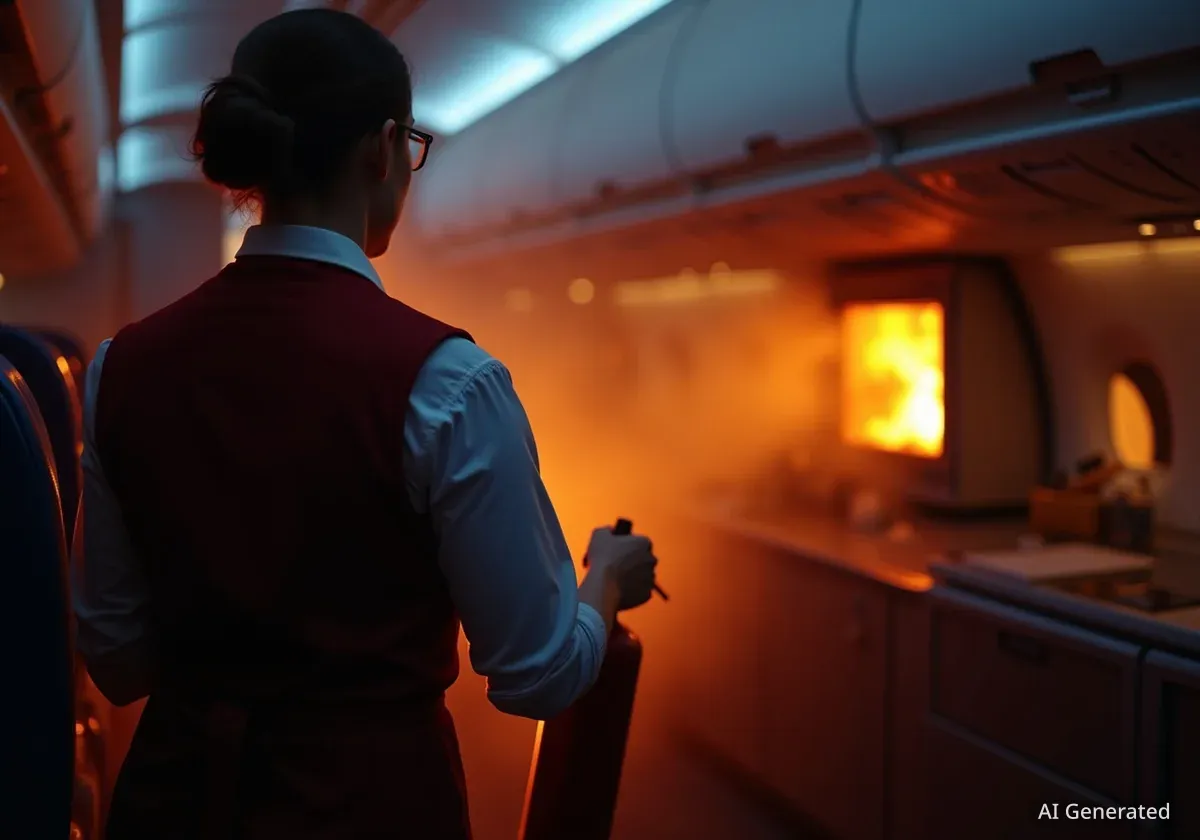A Delta Air Lines Airbus A330, operating Flight DL055 from Lagos, Nigeria, to Atlanta, USA, made an emergency landing in Accra, Ghana, on September 23, 2025. The unscheduled stop occurred after a fire broke out in a galley oven on board the aircraft. Cabin crew quickly put out the fire, ensuring no injuries to passengers or crew.
The diversion led to significant operational changes, including an overnight grounding of the aircraft and a delay of over 24 hours for passengers. This incident highlights airline safety protocols and the challenges of managing unexpected events during long-haul flights.
Key Takeaways
- Delta Flight DL055 diverted to Accra due to a galley oven fire.
- Cabin crew successfully contained the fire with no injuries.
- The aircraft was grounded for over 24 hours in Accra.
- Crew duty time limits caused further delays for the flight.
- Passengers were rebooked on alternative flights.
Emergency Landing Details
Delta Air Lines Flight DL055 departed Murtala Muhammed International Airport (LOS) in Lagos at 11:02 UTC on September 23. Its destination was Hartsfield-Jackson Atlanta International Airport (ATL). The aircraft involved was an Airbus A330 with registration N857NW, which is over 20 years old.
Approximately 70 minutes into the flight, during its ascent, a fire started inside a galley oven. The specific cause of the fire, such as an electrical fault, a foreign object, or fat residue, has not been publicly confirmed by Delta Air Lines or aviation authorities.
"Pilots diverted to Kotoka International Airport (ACC) in Accra, Ghana, circling briefly over Kumasi before landing safely around 12:12 UTC," reported PYOK, an aviation news source. "All passengers and crew disembarked without injury."
The swift action of the cabin crew was crucial in containing the fire. Their training in emergency procedures played a key role in preventing the situation from escalating. This quick response ensured the safety of everyone on board.
Fast Fact
Galley oven fires, while rare, are a specific focus in flight attendant safety training. Crews learn to cut power, use specialized extinguishers, and safely remove any burning items.
Operational Challenges and Passenger Impact
After the safe landing in Accra, the flight could not immediately continue its journey. Aviation regulations impose strict limits on flight crew duty and rest times. The diversion and the time spent on the ground meant that the crew had exceeded their permitted hours.
This regulatory requirement necessitated a change of crew, leading to an extended delay. Delta Air Lines began rebooking affected passengers. Some were placed on an Accra-New York service scheduled for the same evening. Others were accommodated on flights with partner airlines, including KLM, Lufthansa, British Airways, and Air France, to reach their final destinations.
The original Flight DL055 remained grounded in Accra overnight. It eventually departed from Accra for Atlanta on September 25, at approximately 12:00 UTC. This meant passengers faced a delay of more than 24 hours from the initial incident.
Regulatory Compliance and Delays
Crew duty time limits are a critical part of aviation safety. These rules prevent pilot and cabin crew fatigue, which could compromise flight safety. While these regulations are essential, they can cause significant delays when unexpected events occur, such as an emergency diversion.
The airline had to manage logistical challenges. These included finding new flights for hundreds of passengers and arranging accommodation for those stranded in Accra. The incident shows the complex operational environment airlines navigate daily.
Aviation Safety Background
Aviation safety relies on multiple layers of protection, from aircraft design and maintenance to strict operational procedures and crew training. Incidents like galley fires are rare but are addressed through comprehensive emergency protocols. The Nigerian Civil Aviation Authority (NCAA) oversees regulatory compliance for flights originating from Nigeria.
Investigation and Future Implications
As of now, Delta Air Lines has not released an official statement detailing the specific oven model, its maintenance history, or the exact cause of the fire. There have been no confirmed reports of a power interruption, the presence of a foreign object, or fat residue as the cause.
The Nigerian Civil Aviation Authority (NCAA) has acknowledged the incident. They have noted that safety measures were followed. However, the NCAA has not yet published its final investigation findings. Such investigations are standard procedure for aviation incidents to determine the cause and prevent future occurrences.
Data and Public Information
Public data on the number of passengers and crew aboard Flight DL055 during the incident is not yet available. However, flight tracking sources confirm that this Airbus A330 aircraft is regularly used on the Lagos-Atlanta route. The aircraft’s age, over two decades, means it has undergone numerous maintenance checks throughout its operational life.
This incident underscores the importance of thorough inspections of all aircraft equipment, especially galley appliances. It also highlights the need for continuous review of catering processes and emergency readiness plans for long-haul international flights. Airlines must ensure all systems are in top condition to handle any unforeseen circumstances.
- Regular Maintenance: Aircraft components, including galley ovens, undergo strict maintenance schedules.
- Crew Training: Flight attendants receive extensive training on fire suppression techniques.
- Regulatory Oversight: Aviation authorities like the NCAA conduct investigations to ensure compliance and improve safety standards.
The rapid and effective response by the Delta Air Lines crew prevented a potentially serious situation from escalating. Their actions ensured the safety of all individuals on board, allowing for a safe emergency landing and subsequent disembarkation without injury.





